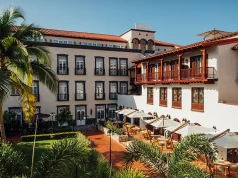
Costa Rica has become an ideal destination for foreigners who choose to work remotely. The country, they say, offers them adequate management of the pandemic and the possibility of combining the work of their countries of residence with surfing classes, trips to the mountains and the Pura Vida.
Digital nomads from Chile, the United States and Portugal have lived and worked – some for periods of months and in other cases for a year – in areas of the country such as Jacó, Manuel Antonio, Santa Teresa de Cóbano and Monteverde, among others.
This experience could soon attract more people who do not depend on a fixed location and use technology to carry out their work, as currently the deputies of the Legislative Assembly are analyzing project No. 22215: Law to attract workers and service providers to the country for remote services of an international nature.
The Portuguese Viviana Gomes Lopes, financial and strategy director of a consultancy in Mexico, thinks that if you like surfing and nature, Costa Rica is the ideal place.
“In the first instance it is an incredible country,” said Gomes Lopes, who lived in Santa Teresa. “They have controlled the pandemic very well, one of the main reasons that made me stay and not go to Mexico City, my city of residence,” he added.
Gomes Lopes arrived in Costa Rica in February 2020 to stay for three weeks. The pandemic took her by surprise on Costa Rican soil and extended her stay in Santa Teresa de Cóbano, Puntarenas, as long as her legal residence permit allowed. From there, he combined his professional work with surf lessons. His dream is not to return to Costa Rica.
“Tourists who stay for longer periods of time redistribute their money more in the value chains generated by tourism, since they make more local purchases, rent a car for several weeks or months, use services such as the beauty salon, the supermarket, restaurant, soda, laundry, greengrocer, medical services, among other businesses in the community, hence the importance of becoming an option for remote workers,” said Gustavo Segura Sancho, Tourism Minister.
Captured by Costa Rica’s Ethical Beauty
If the bill is approved in the Legislative Assembly, remote workers would obtain a permit to stay for one year in the country, extendable for one more year, they would have the possibility of opening bank accounts and the use of their country’s driver’s license of origin, among others.
“In the current situation, where the recovery in tourism could extend for up to three more years before recovering the pre-pandemic demand, the segment of digital nomads is key to the rebound of the sector, a bet that other destinations in the world have already advanced world,” said Minister Segura.
For her part, Megan Kennedy, head of the country office of the Selina accommodation company in Costa Rica, explained that the concept of digital nomad has been part of this chain since its inception, since they have always had areas equipped for work and with sufficient Wi-Fi connection capacity, which has allowed them to experience an increase in the number of guests from all over the world who come to work remotely from Costa Rican soil.
“We are amplifying the speed of the Internet, creating more private places for work calls, as well as coworking areas. The benefit for Costa Rica is obvious because people are going to come to live here, to buy their food, their clothes, to rent a car, participating in the economy while continuing to work,” Kennedy said.
“The beaches are wonderful to surf, the affectionate treatment of the people in all the towns is outstanding, the climate has enchanted me, as well as the nature and the national parks. Costa Rica is ideal to come to work remotely,” commented Raúl Reeves, Chilean entrepreneur and digital nomad, who since January has taken advantage of his work stay to enjoy destinations such as Jacó, Nosara, Tamarindo, Santa Teresa and recently Monteverde.





